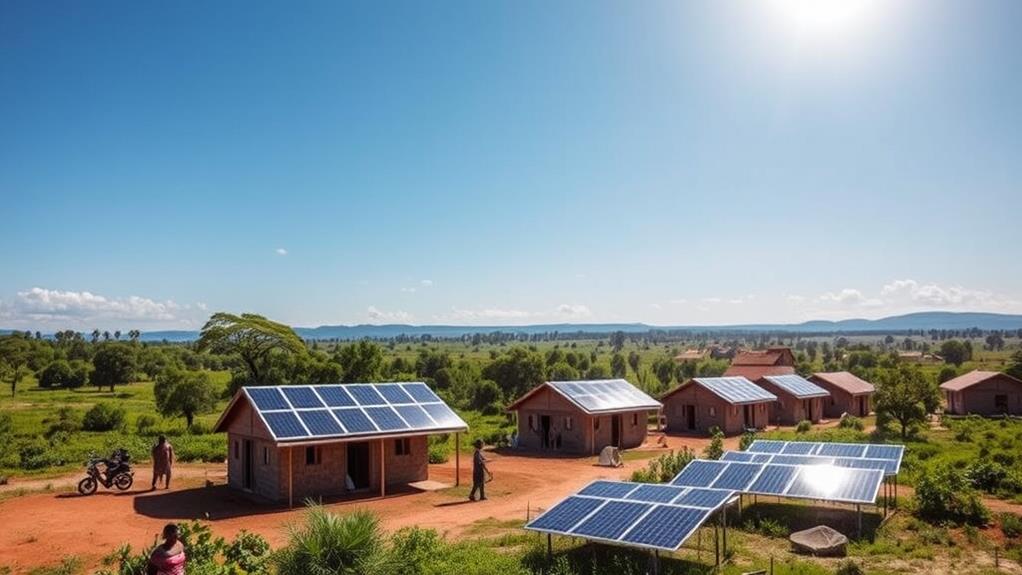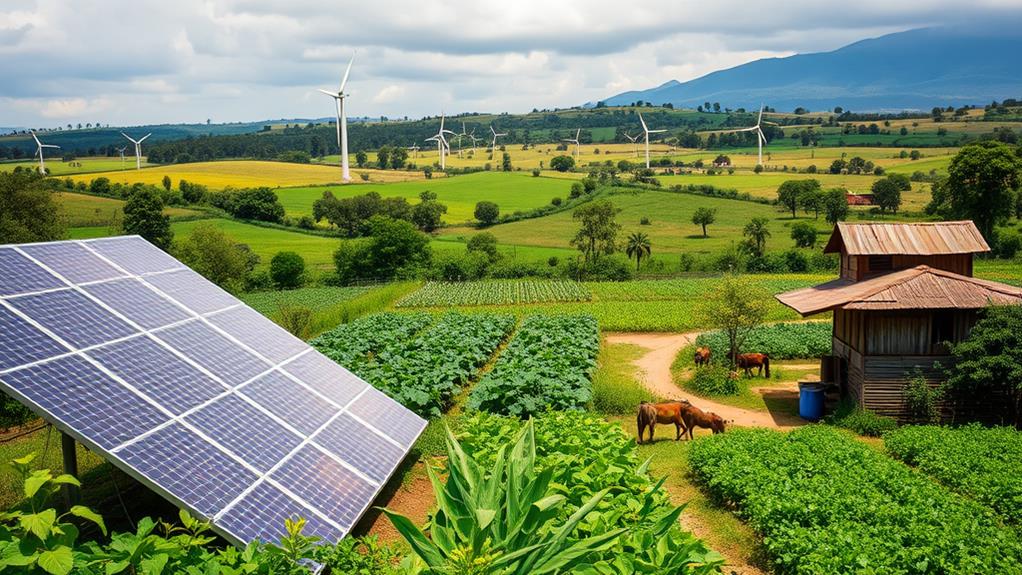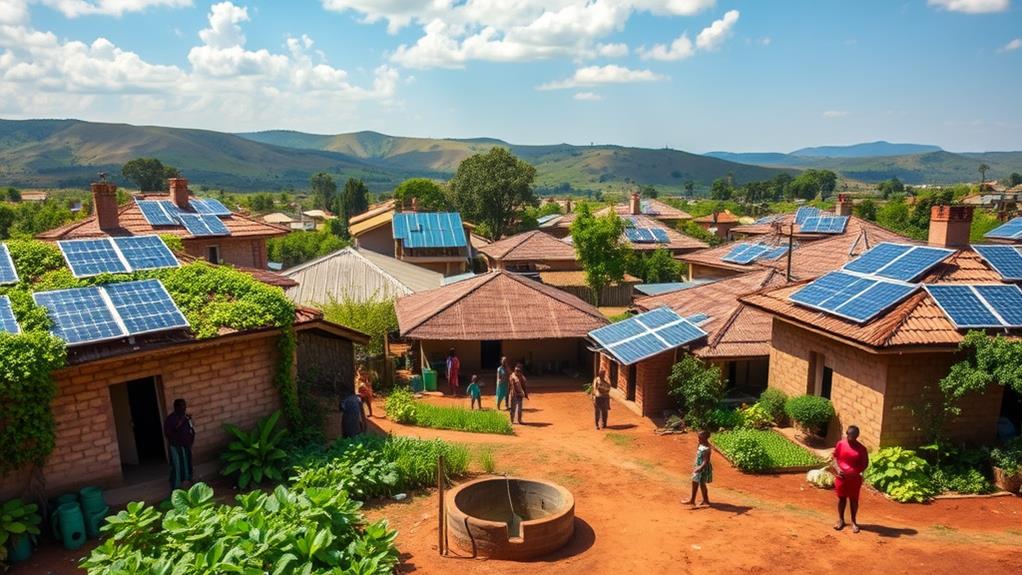Imagine harnessing solar energy to power your home in a remote Kenyan village, turning sunlight into a reliable source of electricity. Off-grid living in Kenya isn't just about surviving; it's about thriving with innovative solutions like rainwater harvesting and permaculture farming. By adopting these practices, you can achieve self-sufficiency and contribute to sustainable community development. But how exactly do these methods transform daily life and resource management? Let's explore the practical steps and real-life success stories that make off-grid living a viable and empowering choice.
Solar Energy Solutions

Harnessing solar energy is one of the most effective ways to power an off-grid lifestyle in Kenya. To get started, you'll need to focus on a proper solar panel installation. First, assess your energy needs by calculating the total wattage of all your devices and appliances. This guarantees you get the right number of panels and the appropriate wattage capacity.
Choosing high-efficiency panels, which can achieve efficiencies between 15% and 22%, can greatly reduce the number of panels required and the overall footprint.
Positioning your solar panels is essential. You'll want to place them on a south-facing roof or an open area that receives maximum sunlight throughout the day. This optimizes energy capture, making sure your system runs efficiently.
Next, you need a reliable energy storage solution. Batteries store the energy your panels generate, providing power during cloudy days or nighttime. Lithium-ion batteries are highly recommended due to their efficiency and longer lifespan compared to lead-acid batteries.
Regular maintenance is also key. Clean your panels every few months to remove dust and debris, making certain they function at peak efficiency.
Check connections and battery health periodically to avoid unexpected power outages.
Water Harvesting Techniques
While solar energy guarantees you have a reliable power source, securing a steady water supply is equally important for sustainable off-grid living in Kenya. One effective method to meet your water needs is rainwater collection.
Install gutters on your roof to direct rainwater into large storage tanks. Make certain these tanks are food-grade and equipped with filters to keep out debris. Regularly clean your collection surface to maintain water quality.
Additionally, integrating solar thermal systems can enhance your off-grid setup by providing hot water for domestic use.
In addition to rainwater, greywater recycling offers another sustainable solution. Greywater refers to wastewater from sinks, showers, and laundry—excluding toilet waste. By setting up a greywater system, you can reuse this water for irrigation or flushing toilets. Use eco-friendly soaps to avoid harmful chemicals in your recycled water. Set up a filtration system to remove larger particles before using the greywater.
Combining rainwater collection and greywater recycling maximizes your water resources while minimizing environmental impact.
These techniques not only provide independence from unreliable water supplies but also promote eco-conscious living. Embrace these water harvesting methods to make certain a reliable and sustainable water source, giving you the freedom to thrive off-grid in Kenya.
Sustainable Farming Practices

Living off-grid in Kenya requires adopting sustainable farming practices to guarantee a consistent food supply and reduce environmental impact. You can achieve this through permaculture design and organic gardening. These methods not only support self-sufficiency but also align with eco-conscious values by preserving natural resources.
1. Permaculture Design: Implementing a permaculture design is essential. It involves creating a self-sustaining ecosystem that mimics natural processes. By integrating elements like water catchment, composting, and diverse plant species, you can cultivate a resilient and productive garden.
This approach minimizes waste and maximizes efficiency. Additionally, permaculture supports the use of solar energy for powering irrigation systems, further enhancing sustainability.
2. Organic Gardening: Embrace organic gardening to avoid synthetic chemicals. Utilize natural fertilizers like compost and animal manure to enrich the soil. Companion planting can help deter pests and enhance plant growth.
This method not only produces healthier food but also improves soil health over time. Using solar power for greenhouse heating can extend the growing season and reduce dependency on external energy sources.
3. Crop Rotation: Practice crop rotation to maintain soil fertility and prevent pest buildup. By changing the types of crops grown in each plot annually, you can break pest cycles and reduce soil depletion.
This technique guarantees long-term productivity and sustainability for your farm.
Adopting these practices offers you the freedom to live sustainably while nurturing the land for future generations.
Renewable Energy Innovations
Renewable energy innovations are key to achieving true off-grid independence in Kenya. By harnessing wind energy and utilizing biomass conversion, you can create a sustainable and reliable energy supply.
Wind energy, for instance, is particularly viable in regions like the Rift Valley and coastal areas where wind speeds are consistently high. Installing small-scale wind turbines can provide your homestead with a steady stream of electricity, reducing your reliance on traditional power grids. Additionally, integrating solar products like 12v solar panels can enhance your energy mix, making your system more robust and flexible.
Biomass conversion, on the other hand, offers a versatile solution by converting organic waste into usable energy. Using agricultural residues, animal waste, or even household organic waste, you can produce biogas through anaerobic digestion. This biogas can power your cooking stoves, water heaters, and even generate electricity.
Not only does this process reduce waste, but it also contributes to a circular economy by turning waste into valuable energy.
Integrating these renewable energy sources can considerably lower your carbon footprint while providing the energy independence you crave. By investing in wind energy and biomass conversion, you're not just powering your home; you're making a statement about self-reliance and environmental stewardship.
Community Success Stories

In the heart of Kenya, inspiring community success stories are emerging as proofs to the power of sustainable living. Local communities are turning to eco-friendly solutions and thriving in ways you might find both fascinating and practical.
1. Community Initiatives: Several villages have come together to form cooperatives that focus on self-sufficiency. They've built rainwater harvesting systems and solar-powered irrigation, guaranteeing water availability all year round.
These community initiatives aren't only fostering a spirit of collaboration but also making life off-grid more manageable.
2. Local Agriculture: Embracing permaculture principles, communities are cultivating diverse crops that thrive in the local climate. By rotating crops and using natural pest control, they're preserving the soil's health and boosting yields.
This approach guarantees food security and reduces dependency on external markets.
3. Skill Sharing: Knowledge is power, and these communities understand it well. They've set up skill-sharing workshops where members teach each other about sustainable practices, such as composting and organic farming.
This exchange of ideas empowers everyone and creates a resilient, eco-conscious society.
Conclusion
So, you're still plugged into the grid and paying those delightful utility bills? Well, in Kenya, they've figured out that the sun and rain are free—who would've thought?! By embracing solar panels, harvesting rainwater, and practicing permaculture, these communities are not just surviving but thriving. Maybe it's time to reconsider your urban jungle and get a taste of real sustainability. After all, Mother Nature doesn't charge late fees.
